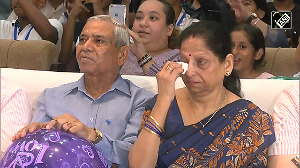"There is too much focus on building, infrastructure, the number of teachers (as opposed to quality), number of laboratories and so on.
"If the focus shifts to quality, many of the new universities will face problems in getting notified.
Vineet Gupta, co-founder and managing director, Jamboree, a study abroad counselling company shares his concerns.
 Jamboree, which started from a garage in Delhi, is now coaching 15,000 students across 14 cities in India a year for the GMAT, GRE and SAT and also assisting students to gain admission in foreign universities.
Jamboree, which started from a garage in Delhi, is now coaching 15,000 students across 14 cities in India a year for the GMAT, GRE and SAT and also assisting students to gain admission in foreign universities.
Concerned at the growing exodus and lack of credible options in India, Jamboree's co-founder and managing director Vineet Gupta slowly got involved in Ashoka University as founder and trustee.
He spoke to Anjuli Bhargava about the trends in overseas education options, the numbers and the lack of regulation for private universities in India. Excerpts:
How many students leave India every year for higher studies overseas?
The English-speaking Western countries attract the chunk -- so the US, the UK, Australia, and Canada remain big.
Ireland and New Zealand have been later entrants.
In the past seven to eight years, the big surge has been to Singapore, while Dubai and Middle East have also emerged as options.
However, the numbers remain small. Singapore, for instance, has only three large universities and the seats are limited.
Of late, we have started seeing students going to mainland Europe. Both France (Ecole) and Germany have started various courses in English.
The other big change is that students are not restricted to Delhi, Mumbai and other metros.
In smaller cities like Jaipur, we (Jamboree) train almost 700 students a year, of which 200 to 300 manage to get admission.
Other small cities like Dehradun, Chandigarh (we coach around 1000 a year) have also come up. We are now in 14 cities in India.
As per our assessment, at the undergraduate level around 40,000 students leave in a year.
This was around 15,000 in 2008.
This is of course a total change from the time when we graduated. In the early- to mid-1990s, it may have been a couple of thousands.
Affordability, loan availability, exposure and the inability to make it to universities here are some of the push factors.
At the undergraduate level for a certain socio-economic lot, applying overseas is almost a back-up. It's a given.
Our own system is to blame.
What do you do with a student who gets, say, 91 per cent or even 85 per cent?
The country has virtually no education to offer them. Then if the option is between, say, a Rajdhani college or Wisconsin or UC Berkeley, there is a stark difference in the education gained.
At the postgraduate level, the numbers are far larger.
In my opinion, almost 120,000 Indian students leave every year.
A large proportion of this go for management courses -- I would say around 30,000 -- and the rest are for master's courses.
Within the master's, a substantial number are for higher degrees in computer science, electrical engineering and biotechnology.
At the master's level, a lot of middle-class families take loans and send students since at this stage the vacuum in India is even higher.
There are very few seats at the master's and doctorate level. Also, rates of return for a masters in a technical field are very high.
Students typically take a loan of Rs 20 lakh (for a course that costs Rs 30 lakh over two years) and when they graduate they earn salaries of roughly $80-90,000 a year.
In two years, they manage to pay off their loan. So the rate of return is high.
At the undergraduate level (four years), it is more affluent families who send their children.
The rates of return are lower and it is costlier and riskier.
One of the reasons I got into Ashoka is that the penny dropped for me very early on.
I would see students who were bright but even with 90 per cent, they would not make it into any of the good Delhi University colleges.
The need for credible Indian options was very evident to me even back then.
What about regulation of the innumerable private universities that have come up?
It's a classic case of being over-regulated but not governed.
The law is there. But there is a problem with the criteria for evaluation itself.
Inspectors focus on how much area or land you have, how many departments, how many faculty members.
It is an input-based evaluation and that too quantitative, not qualitative.
So it is how many teachers not what kind of quality in teachers.
We need output-based evaluation of these universities.
There is too much focus on building, infrastructure, the number of teachers (as opposed to quality), number of laboratories and so on.
If the focus shifts to quality, many of the new universities will face problems in getting notified.
With over 60 per cent of high education in private hands, it's high time someone started looking into this.
At present, the government's attitude is: 'Oh, that is private. what can we do?'
Why can't bodies like Crisil or CARE come up and rate private universities?
Why can't we have an Education Regulatory Authority of India?
I personally believe we have a huge crisis when it comes to higher education in India on our hands.
Lead image used for representational purposes only. Credit: Jonathan Alcorn/Reuters











